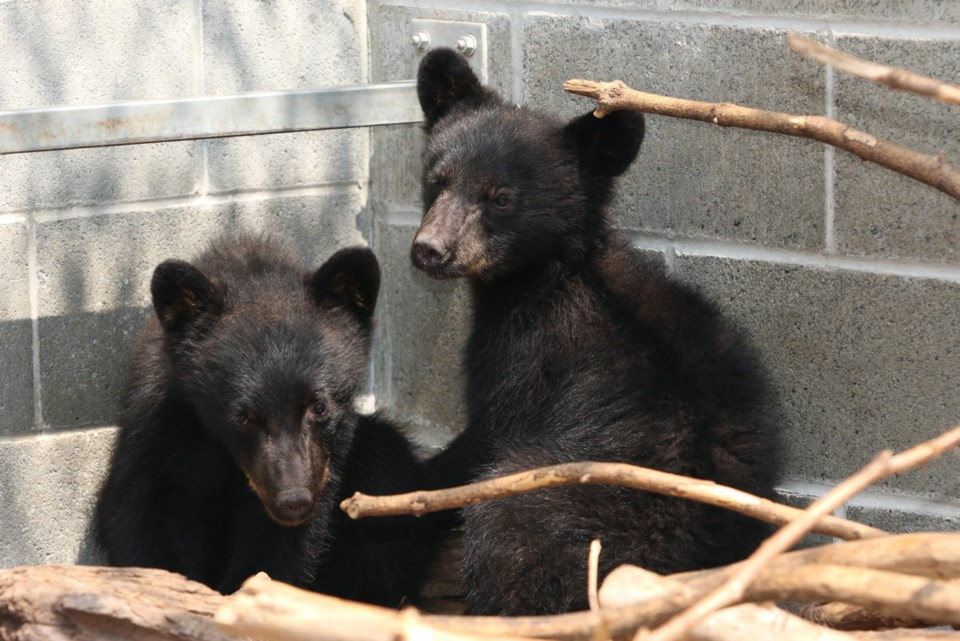The suspension of a B.C. conservation officer for refusing to kill a pair of orphaned black bear cubs is generating international attention, says the founder of the wildlife shelter where the cubs are staying.
Robin Campbell of the North Island Wildlife Recovery Association in Errington said the cubs — a male and female who have been named Jordan and Athena — are fitting in well with other bears at the facility and showing no signs of “habituation,” or lack of wariness toward humans.
The cubs were born in January or February, said Campbell, who has fielded calls about the story from as far away as Europe. The animals’ mother was killed after twice breaking into a freezer in a mobile home in the Port Hardy area.
An online petition calling for conservation officer Bryce Casavant’s reinstatement had generated more than 65,000 signatures by Wednesday night from across Canada and the United States. Comedian Ricky Gervais, who calls himself an “animal avenger,” has posted a link to news coverage of the story on his social media accounts and is calling for an end to Casavant’s suspension.
›› Scroll down for a video about the NIWRA
“Reinstate this honourable man,” Gervais wrote in a Facebook message.
Another petition signer wrote: “This wildlife officer did his job. Reinstate him, and give him a raise.”
The suspension was originally unpaid, but Casavant is now receiving pay. He will be paid back to the start of the suspension, said Stephanie Smith, president of the B.C. Government and Service Employees’ Union. “Our position is that we will aggressively defend our member.”
Smith said Casavant was performing his duties as required. “The current provincial policy allows conservation officers to make a judgment on whether or not to kill an animal, based on whether they’re considered a public-safety risk.”
Campbell said he has always had positive dealings with Casavant, praising him for his professionalism. “This just doesn’t make sense. Let’s just hope it works itself out soon.”
Chris Doyle, acting deputy chief of provincial operations for the B.C. Conservation Officer Service, said privacy rules prevented him from addressing personnel matters related to Casavant, so he could only offer general information about the Port Hardy incident.
“This is a very unfortunate situation, that conservation officers were forced to intervene and destroy a sow bear that was in conflict,” Doyle said.
Killing an animal is never easy, Doyle said, adding that he has had to do it himself.
“It’s a situation that no conservation officer wants to be in, but unfortunately, due to the numbers and natures of conflict that we have occurring in some communities in British Columbia, it is at times necessary for conservation officers to protect public safety.
“In this case, there was orphaned cubs involved. That does happen at times. Conservation officers and senior ministry staff, biologists, as well as wildlife veterinarians will determine how orphaned cubs are dealt with.”
Experts look at a number of factors, Doyle said, including the health and condition of the animals, as well as their level of habituation to humans and food conditioning — seeking out human sources of food, such as garbage cans.
“Older cubs may be allowed to carry on wild in the environment. Smaller cubs may go into wildlife-rehabilitation facilities,” he said.
Initial information about the Port Hardy cubs, who were retrieved from a tree on Sunday, is that they were exposed to conflict with humans and had shown evidence of both habituation and food conditioning, Doyle said. Further assessment is taking place.
Doyle said there are plenty of cases where orphaned cubs survive and do well.
“Recently, conservation officers have released a number of orphaned bears that we took to those facilities back into the wild,” he said.
“Obviously, the preference is to keep the bears alive and wild, and to prevent conflicts from happening in the first place.”
> For information about the petition, go to the change.org website via this shortened web address: tinyurl.com/porthardybears



